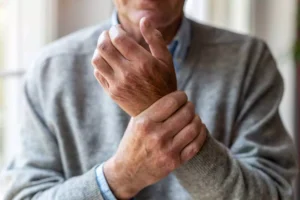Alexa was about to die, and she couldn’t do a thing about it.
Though they didn’t realize it at the time, her friends were watching her die. That actually made Alexa feel worse for them than she did for herself; her friends, after all, were the ones who thought she was just acting silly. They could see Alexa floating facedown in the swimming pool, and she could hear them telling her to knock it off.
But Alexa wasn’t messing around. She couldn’t knock it off if she tried because she had definitely tried. Still, she couldn’t move. She was suddenly quadriplegic.
No one knows exactly how it happened, not even Alexa. No one watched her dive into the deep end because they had all done the same thing that afternoon. All Alexa knows for sure is that her head struck something hard—the side of the pool, or perhaps the bottom—and she felt what she can only describe as an electrical pulse. That pulse radiated outward, she says, from the center of her body to her fingers and toes.
“At that point, I floated up to the top of the water in a type of dead man’s float.”
Alexa
Alexa isn’t sure how long she floated, but it was long enough for her to think of her friends and their reaction to finding her this way. Thankfully, one of them was curious enough or cautious enough to call her bluff and turn her over, and that’s when Alexa discovered that her respiratory system, at least, still functioned. She wasn’t dead yet, as her huge gasp for air clearly demonstrated. “What’s the deal?” someone asked, and Alexa said the deal was that she couldn’t move.
Not her arms. Not her legs. Nothing.
“Should we call 911?” her friends wondered aloud.“Yes,” Alexa said. “You should definitely call 911.”
More Information on Becoming Quadripigic and Disabilities
Before Quadriplegia: A Typical Girl
The weather in San Angelo on April 6,
2006 was breezy and unseasonably warm, even by west Texas standards. Temperatures were in the mid-80s that afternoon, perfect for a group of high school kids eager for a taste of summer. Ideal for an after-school dip in a friend’s backyard pool.
Alexa’s life in San Angelo was also idyllic by any standards. Her family lived across the street from a park, where everyone played, and everyone felt safe.

Her mother, Marsha, says they were a “typical middle-class family, involved in church, school, sports.” Alexa still recalls her parents praying together every morning and the neighborhood kids gathering in the park most afternoons to play cops and robbers. She loved all of it.
Her high school was relatively small (again, by Texas standards), so Alexa did a bit of everything—student council and Spanish club, plus basketball, softball and tennis. She was also the school’s mascot: a green hawk named Wally. “The costume was nearly unbearable for early football games in the west Texas heat,” she says, “but by the time November rolled around, I was completely comfortable.”
By early April, however, Alexa and three friends from church were restless and bored. Alexa was 17, a high school junior and itching to dive into a pool—something they had all done, probably
a hundred times before.
Everything Changed
Paramedics arrived and placed Alexa in a cervical collar. Her parents showed up as well, and Alexa gave them a sheepish “hi,” as if she’d gotten caught skipping class. She didn’t yet understand how much her life had changed. She joked with a friend that she probably wouldn’t make it to math class the next day, but the grim look on her parents’ faces gave her pause.
At the hospital came X-rays and tests, followed by a “let’s-talk-in-the-hallway” moment between parents and physicians. Marsha broke the news to her daughter. Diagnosis: a traumatic brain injury, a fracture of the C5 vertebra and severe spinal cord damage. Prognosis: paralysis of the upper and lower body. In other words, quadriplegic. Life in a wheelchair.
Alexa was injured on a Thursday.
The following Thursday, her right lung collapsed due to infection, possibly from inhaling water. The following Thursday, she suffered a seizure stemming from her brain injury.
Altogether, Alexa spent six weeks in the hospital. She lost her mobility, muscle tone and nearly all memories of the previous 12 months. Her entire junior year and some of her sophomore year . . . gone.

She also lost her previous way of life. “Many of Alexa’s friends fell away,” Marsha says, “because she couldn’t do the things they were doing.” [Due to the quadriplegia.]
A New Normal As a Quadripligic
“Every aspect of my life was affected,” Alexa says. She spent that summer at a rehab facility in Houston, relearning basic tasks like eating and brushing her teeth with the help of assistive devices. As Alexa’s physical challenges continued, her mental struggles began.
“Part of me knew that trials are a part of life, but another part struggled with why God would allow this to happen,” she admits. “It was a real crisis of faith. I finally decided that I was ‘all-in,’ and I continued following God despite how I was feeling. I still occasionally doubted, but my resolve never wavered.”
Alexa managed to complete her senior year on schedule and then stayed at home to attend Angelo State University. After college, she considered medicine, but her physical limitations made that seem impractical. She pivoted to law, and in 2016, 10 years after her accident, Alexa earned her J.D. from Southern Methodist University.
Volunteering with Quadripligia
She saw the Facebook post during her third year of law school: Focus on the Family was seeking volunteers for its Digital Outreach ministry, and Alexa was intrigued. While traditional mission trips and community service are tough to manage from a wheelchair as a quadriplegic, anyone with an internet connection can reach out to hurting people on social media. Alexa started volunteering soon after she passed the bar exam, and she’s been at it ever since.
Maddie Thomas, Alexa’s coach on the Digital Outreach team, says Alexa is among the program’s most consistent and most prolific volunteers. “Alexa blew me away with her empathy, wisdom and faith,” Maddie says. “She is one of our younger volunteers but has a range of life experiences that make her able to reach a variety of people.”
“There are so many people looking for answers online,” Alexa says, “and probably an equal or even greater number of people online who put them down and are just plain mean. Being a positive voice in all the negativity really does make a difference.
















